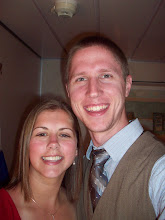Continuing with the water motif in Exodus 1-15...
Some have claimed that the plagues are representative of YHWH showing his power over the gods of Egypt (though I think this is a stretch for some of them!). My OT professor, Dr. Shipp, makes the case that the plagues are actually an overturning of creation as YHWH does cosmic battle with Pharaoh (who claims to be a god himself). I think he makes a convincing argument. There are references throughout the first 15 chapters not only to water but back to Genesis and back to creation and chaos. As Dr. Shipp says, "This is what happens when God is at war!"
If it is the case - and I think it is - that the plague narratives are an overturning of creation because of the cosmic battle between YHWH and Pharaoh, then the water motif, culminating at the event of the sea, deals the final crushing blow. It is at the sea where the evil oppressor (represented as Egypt) is swallowed up while God's chosen people (Israel) are delivered and redeemed. The plagues serve as an overturning of creation, culminating in the return to and destruction of "evil" in the waters of chaos. Following YHWH's victory at the final scene of the Exodus, he then restores creation through the redeemed of Israel, culminating in the establishment of the Temple, the meeting place (coming together) of Heaven and Earth.
Looking at the events of the cross, we see a similar pattern. The great theophany takes place as God battles evil one final time, facing death head on. Through the death and resurrection of Christ, he deals the final crushing blow, gaining victory over evil and redeeming his people. Through the redemption of his people in the resurrection of his son, YHWH is restoring all of creation which will culminate in the final coming together of the new heaven and new earth and the swallowing up of evil (see Rev. 21) . This overcoming of evil, restoration of creation, and coming together of the new heaven and earth has already begun and is taking place in the life of the church today.
Grace to you,
Matt
Subscribe to:
Post Comments (Atom)

No comments:
Post a Comment